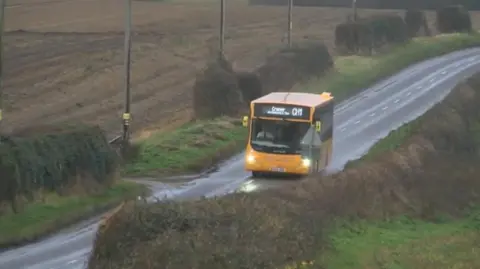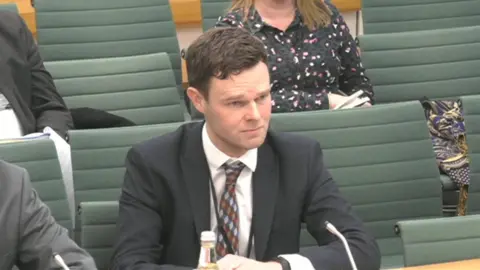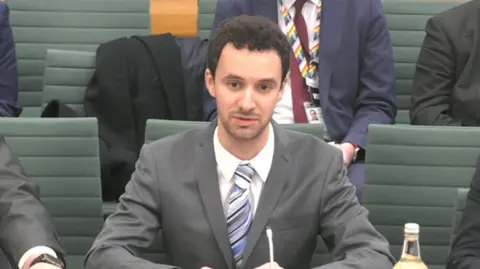MPs told parts of eastern England are public transport desert
 BBC
BBCMPs have been told that parts of the East of England are a "public transport desert".
Andrew Summers, the strategic director of Transport East, which oversees bus and rail services in Norfolk, Suffolk and Essex, gave evidence to the Transport Select Committee.
He said problems with the accessibility of public transport in more rural areas was leading to "isolation and exclusion".
The Department of Transport said it was "considering how to provide effective support for the bus sector".
 UK Parliament
UK ParliamentMr Summers said a third of people in the three counties live in rural communities and that two-thirds of them were "living in a transport desert... unable to access services, education or training by any means realistically, apart from the car".
He said North Norfolk was a particular problem where some young people were spending almost £1,000 a year to travel from Cromer to Norwich by public transport to access skills training.
When MPs asked about the provision of rail services in rural areas, he pointed to the East Suffolk line which went from a two-hourly service to an hourly service and saw a 200% increase in passengers.
 UK Parliament
UK ParliamentChris Hinchliff from the Campaign to Protect Rural England told the committee that a recent survey had found that 86% of those aged 18-25 wanted to move out of rural areas, citing infrequent transport links as a key reason.
"The real problem... is that many rural areas are never going to have the population density to support the level of services those communities need at a profitable rate.
"We need to see the government step in and ensure a comprehensive bus network is delivered."
He said some European countries have minimum service guarantees and called for similar conditions to be enshrined in law, promising a bus service for every village every hour.
A spokeswoman for the Department of Transport (DfT) said it had "already invested £2bn to protect existing bus routes from the impacts of the pandemic, in addition to more than £1bn to support bus service improvements".
She said the DfT had invested £60m to cap single bus tickets at £2 across England from 1 January to 31 March.
"We are actively considering how to provide effective support for the bus sector," she added.
Find BBC News: East of England on Facebook, Instagram and Twitter. If you have a story for us, email [email protected]
